Our Savior, My Redeemer-A
Index
Working
Definitions
Savior – The one who brings about the result.
Redeemer – The person who pays the price to bring about the result.
STEP ONE
Who Am I ?
The question has intrigued thinkers in every
age; and our search to find the answer helps us to better understand ourselves, God
and His nature which is love, our relationship to him and our relationship to
others.
The answer is both simple and clear:
 I am a created rational human person made up of not only just a body or only just a soul, but
of the substantial union of both in a unique personality.
I am a created rational human person made up of not only just a body or only just a soul, but
of the substantial union of both in a unique personality.

I also have a special human nature unique only to myself which is
measured by height, weight, color of eyes, long/short fingers, hair color
texture, etc.
These marks identify each of us as a human person and a totally unique
individual.
I have always existed in
God’s consciousness and my existence is the result of His love for me. The
purpose of my physical life is to make use of the opportunities he offers each
day to show him how much I love him in what I do.
What are these opportunities? (This needs
some explaining)
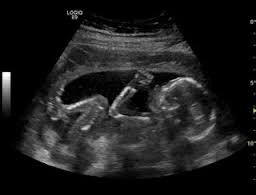
 My
real birthday marked the moment when I was first formed in my mother’s womb.
On the left is my sonogram picture as she nourished me and protected me for
about nine months before my independent earthly experience began. I have
never been alone, because then as now I am accompanied by my own special
guardian angel and my earthly mother and father. I am also supported by
all the angels, the saints, Mary, God the Father, God the Son, and God the Holy
Spirit. My earthly task is to cooperate with
My
real birthday marked the moment when I was first formed in my mother’s womb.
On the left is my sonogram picture as she nourished me and protected me for
about nine months before my independent earthly experience began. I have
never been alone, because then as now I am accompanied by my own special
guardian angel and my earthly mother and father. I am also supported by
all the angels, the saints, Mary, God the Father, God the Son, and God the Holy
Spirit. My earthly task is to cooperate with
 the
gifts God the Father, God the Son, and God the Holy Spirit give me to show them
how much I love them.
the
gifts God the Father, God the Son, and God the Holy Spirit give me to show them
how much I love them.
Since I am a unique, one-of-a-kind individual with
a physical body animated by an immortal soul and destined to be united again
with God when my physical body dies, things should go pretty smoothly here on
earth - right?
Not Always!
Only humans have been gifted with the ability to
think (rationalize) . . . this means that each of us can
make choices and
decisions. Using
our gifts, we humans have created abstract social systems and laws that are possible
only because we have the ability to understand, and have been gifted with the ability
to use and work with non-material ideas and concepts such as numbers, space,
time, beauty and truth. As the Declaration of Independence states clearly “. .
. . we the people possess certain rights . . .”
But . . . “We the People” Have A Systemic
Problem, and it can be traced to one source – pride!
Pride is a very part of
all of us and we all possess it in different degrees. It is the number one
source of problems not only for ourselves, but in our relationships with others. A wise person once said, “We are
so filled with pride that it takes at least 24 hours after we die for it all to
run out.”
Let's
Back Up
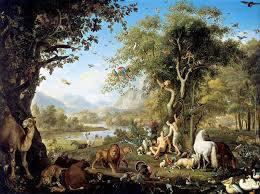 In
the beginning, things were very good. The Lord God formed Adam (the first
man) from the earth and breathed into him a living
soul (the principle of life). A partner was created for man named Eve
(who became the mother of all the living). Everything created could have been
enjoyed by the first man and woman as they were superior to all earthly
creation. But there was one condition – they were not to eat the attractive
fruit of a certain tree (experience the results of a choice that was available
to them). They were aware of the fact that if they ignored God and chose to
follow their wills instead of His, they would surely die (remove themselves from
God’s love). But this warning was ignored because of the attractive suggestion
presented by "The Prince of Evil," the devil, that they could become better than they were . . . even become god-like . .
. and that would mean knowing good from evil! WOW!
In
the beginning, things were very good. The Lord God formed Adam (the first
man) from the earth and breathed into him a living
soul (the principle of life). A partner was created for man named Eve
(who became the mother of all the living). Everything created could have been
enjoyed by the first man and woman as they were superior to all earthly
creation. But there was one condition – they were not to eat the attractive
fruit of a certain tree (experience the results of a choice that was available
to them). They were aware of the fact that if they ignored God and chose to
follow their wills instead of His, they would surely die (remove themselves from
God’s love). But this warning was ignored because of the attractive suggestion
presented by "The Prince of Evil," the devil, that they could become better than they were . . . even become god-like . .
. and that would mean knowing good from evil! WOW!
Pretty Attractive . . . but a Bad Choice!
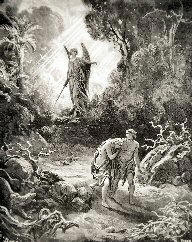 In spite of God’s warnings, the first humans
made a choice . . . and messed up their relationship with God not only for
themselves, but their children . . . which is us!
In spite of God’s warnings, the first humans
made a choice . . . and messed up their relationship with God not only for
themselves, but their children . . . which is us!
Oh My Gosh!
What God said would happen – did happen! Both
Adam and Eve came to know suffering and eventual physical death. But while God
is all-just, He is also all-perfect in love and mercy; and in his mercy for our
first parents and their descendants (you and me), He made the following covenant
with them.
God’s Covenant Made in Love
" . . . I will put enmity
between you (the devil), and the woman, and between your offspring (those who follow him) and hers; He
(Jesus) will strike at your head, while you
strike at his heel. (Genesis 3:15)
What God's Covenant Meant
Never-ending hatred would exist between Lucifer, the most gifted of the fallen angels, the other fallen angels,
and their followers who struggle against Mary, the new Eve, and her son – Jesus Christ.
The Bible tells how man attempted to please God
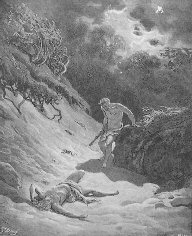 Since humans had disobeyed and distanced
themselves from God, it was important for them to learn his will; and
understand what pleased and what displeased him. The story of the offerings of
Cain and Abel is one of the first bible accounts to illustrate the importance of a
well-formed faith.
Since humans had disobeyed and distanced
themselves from God, it was important for them to learn his will; and
understand what pleased and what displeased him. The story of the offerings of
Cain and Abel is one of the first bible accounts to illustrate the importance of a
well-formed faith.
An offering from the fruit of the soil - Cain:
in the course of time Cain brought an offering to the Lord from the fruit of
the soil. (Genesis 4:3) His offering choice was not the best of
his crops. He kept a better portion for himself.
. . . .while Abel, for his part brought one of the best firstlings of his
flock. (Genesis 4:4-5) God looked with favor on
Abel' s sacrifice because his offering contained the best he had while Cain's
sacrifice was selected from merely some of what he owned. Cain's envy led
to his brother's eventual death which caused Cain to both leave his parents and
to wander far from his homeland.
HUMAN
SACRIFICE?
The Story of Jephthah
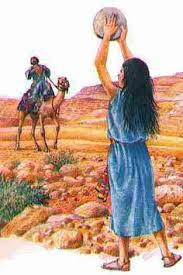 An Israelite chieftain named Jephthah made
a rash vow to the Lord before battle swearing that if he were successful, he
would offer as a holocaust the first person to greet him when he returned home.
He was victorious, but his vow bound him to sacrifice his daughter and only
child whom he loved dearly. "If you deliver the Ammonites into my power," he
promised, "whoever comes out of the doors of my house to meet me when I return in
triumph from the Ammonites shall belong to the Lord. I shall offer him up
as a holocaust." (Judges 11:30-31)
An Israelite chieftain named Jephthah made
a rash vow to the Lord before battle swearing that if he were successful, he
would offer as a holocaust the first person to greet him when he returned home.
He was victorious, but his vow bound him to sacrifice his daughter and only
child whom he loved dearly. "If you deliver the Ammonites into my power," he
promised, "whoever comes out of the doors of my house to meet me when I return in
triumph from the Ammonites shall belong to the Lord. I shall offer him up
as a holocaust." (Judges 11:30-31)
When Jephthah returned to his house in Mizpah, it was his
daughter who came forth, playing the tambourines and dancing. She was an
only child: he had neither son nor daughter besides her. When he saw her,
he rent his garments and said, "Alas, daughter, you have struck me down and
brought calamity upon me. For I have made a vow to the Lord and I cannot
retract." (Judges 11:34-35)
The Story of Abraham and Isaac
When they came to
the place of which God had told him, Abraham built an altar
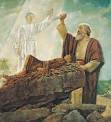 there and arranged
the wood on it. Next he tied up his son Isaac, and put him on top of the
wood on the altar. Then he reached out and took the knife to slaughter his
son. But the Lord's messenger called to him from heaven, "Abraham.
Abraham,!" "Yes Lord," he answered. "Do not lay your hand on the
boy," said the messenger. "Do not do the least thing to him. I know
now how devoted you are to God, since you did not withhold from me your own
beloved son." As Abraham looked about, he spied a ram caught by its horns
in the thicket. So he went and took the ram and offered it up as holocaust
in place of his son. (Genesis 22:9-13)
there and arranged
the wood on it. Next he tied up his son Isaac, and put him on top of the
wood on the altar. Then he reached out and took the knife to slaughter his
son. But the Lord's messenger called to him from heaven, "Abraham.
Abraham,!" "Yes Lord," he answered. "Do not lay your hand on the
boy," said the messenger. "Do not do the least thing to him. I know
now how devoted you are to God, since you did not withhold from me your own
beloved son." As Abraham looked about, he spied a ram caught by its horns
in the thicket. So he went and took the ram and offered it up as holocaust
in place of his son. (Genesis 22:9-13)
This story while showing a test of Abraham's love is thought to contain God's message to
Abraham and his people that the practice of human sacrifice common among his
neighbors did not please God.
ANOTHER DIRECTION
As time
passed, some people mistakenly believed that
God would give more attention to requests for favors if they made more frequent,
larger, and more valuable sacrifices of crops, animals, money and possessions.
Early Prophets Announce A Change
I hate, I spurn your feasts, I take no pleasure in your solemnities, your
cereal offerings I will not accept, nor consider your stall-fed peace offerings.
Away with your noisy songs. I will not listen to the melodies of your
harps. But if you would offer me holocausts, then let justice surge like
water, and goodness like an unfailing stream. (Amos 5:21-24)
Does
the Lord so delight in holocausts and sacrifices as in obedience to the command
of the Lord? Obedience is better than sacrifice, and submission than the
fat of rams. (1 Samuel 15:22)
For it is love that I desire not sacrifice, knowledge of God rather than
holocausts (Hosea 6:6)
A
SAVIOR IS FORETOLD
A later covenant included a special birth:
For a child is born to us, a son is given us; upon his shoulder
dominion rests. They name him Wonder-Counselor, God-Hero, Father-Forever,
Prince of Peace. His dominion is vast and forever peaceful, from David's
throne, and over his kingdom, which he confirms and sustains by judgment and
justice, both now and forever. The zeal of the Lord of Hosts will do this!
(Isaiah 9:5-6)
What would this child be like?
God's plan gradually unfolded over the years. Some people did not have a
clear idea what this promised Savior could or would do; asking themselves and
each other . . . how will this promised Savior possible satisfy for the insult
and rejection humans showed their creator through our first parent's sin of
pride?
The prophet Isaiah
described the person.
Here
is my servant whom I uphold, my chosen one with whom I am pleased, upon whom I
have put my spirit; he shall bring forth justice to the nations, not crying out,
not shouting, not making his voice heard in the street. A bruised reed he
shall not break, and a smoldering wick he shall not quench, until he establishes
justice on the earth; the coastlands will wait for his teaching.
(Isaiah 42:1-3)
He grew up like a sapling before him, like a shoot from the parched
earth; there was in him no stately bearing to make us look at him, nor
appearance that would attract us to him. He was spurned and avoided by
men, a man of suffering, accustomed to infirmity, one of those from who men hide
their faces, spurned, and we held him in no esteem. Yet it was our
infirmities that he bore, our sufferings that he endured, while we thought of
him as stricken, as one smitten by God and afflicted. But he was pierced
for our offenses, crushed for our sins, upon him was the chastisement that makes
us whole, by his stripes we were healed. (Isaiah 53:2-5)
 A later Gospel
writer repeats the same message!
A later Gospel
writer repeats the same message!
Here is my servant whom I have chosen, my loved one in whom I
delight. I will endow him with my spirit and he will proclaim justice to
the Gentiles. He will not contend or cry out, nor will his voice be heard
in the streets. The bruised reed he will not crush; the smoldering wick he
will not quench until judgment is made victorious. In his name, the
Gentiles (referring to the non-Jews - the people of the earth) will find
hope. (Matthew 12:21)
 I am a created rational human person made up of not only just a body or only just a soul, but
of the substantial union of both in a unique personality.
I am a created rational human person made up of not only just a body or only just a soul, but
of the substantial union of both in a unique personality. 

 My
real birthday marked the moment when I was first formed in my mother’s womb.
On the left is my sonogram picture as she nourished me and protected me for
about nine months before my independent earthly experience began. I have
never been alone, because then as now I am accompanied by my own special
guardian angel and my earthly mother and father. I am also supported by
all the angels, the saints, Mary, God the Father, God the Son, and God the Holy
Spirit. My earthly task is to cooperate with
My
real birthday marked the moment when I was first formed in my mother’s womb.
On the left is my sonogram picture as she nourished me and protected me for
about nine months before my independent earthly experience began. I have
never been alone, because then as now I am accompanied by my own special
guardian angel and my earthly mother and father. I am also supported by
all the angels, the saints, Mary, God the Father, God the Son, and God the Holy
Spirit. My earthly task is to cooperate with
 the
gifts God the Father, God the Son, and God the Holy Spirit give me to show them
how much I love them.
the
gifts God the Father, God the Son, and God the Holy Spirit give me to show them
how much I love them.  In
the beginning, things were very good. The Lord God formed Adam (the first
man) from the earth and breathed into him a living
In
the beginning, things were very good. The Lord God formed Adam (the first
man) from the earth and breathed into him a living

 Since humans had disobeyed and distanced
themselves from God, it was important for them to learn his will; and
understand what pleased and what displeased him. The story of the offerings of
Cain and Abel is one of the first bible accounts to illustrate the importance of a
well-formed faith.
Since humans had disobeyed and distanced
themselves from God, it was important for them to learn his will; and
understand what pleased and what displeased him. The story of the offerings of
Cain and Abel is one of the first bible accounts to illustrate the importance of a
well-formed faith. 
 there and arranged
the wood on it. Next he tied up his son Isaac, and put him on top of the
wood on the altar. Then he reached out and took the knife to slaughter his
son. But the Lord's messenger called to him from heaven, "Abraham.
Abraham,!" "Yes Lord," he answered. "Do not lay your hand on the
boy," said the messenger. "Do not do the least thing to him. I know
now how devoted you are to God, since you did not withhold from me your own
beloved son." As Abraham looked about, he spied a ram caught by its horns
in the thicket. So he went and took the ram and offered it up as holocaust
in place of his son. (Genesis 22:9-13)
there and arranged
the wood on it. Next he tied up his son Isaac, and put him on top of the
wood on the altar. Then he reached out and took the knife to slaughter his
son. But the Lord's messenger called to him from heaven, "Abraham.
Abraham,!" "Yes Lord," he answered. "Do not lay your hand on the
boy," said the messenger. "Do not do the least thing to him. I know
now how devoted you are to God, since you did not withhold from me your own
beloved son." As Abraham looked about, he spied a ram caught by its horns
in the thicket. So he went and took the ram and offered it up as holocaust
in place of his son. (Genesis 22:9-13)  A later Gospel
writer repeats the same message!
A later Gospel
writer repeats the same message!